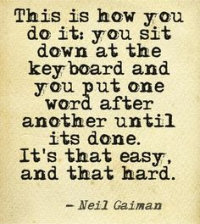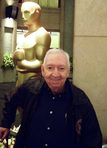To Write or Not to Write
I have authored this blog for over three years and that is well over a hundred articles I have written. Most have been about the art of being an author and have included tips which I have discovered throughout my writing career. Other blogs have been about adventures I have had in life. Today’s blog is about the philosophy of writing.
I have mentioned several times in earlier blogs that a lot of people contact me about wanting to become a part of the writing profession. More times than not they tell me they have a great idea for a book or a screenplay. They then go on to tell me that if I will write it for them, get an agent to represent it and find a publisher or producer for it, they will give me part of the revenue. Wow, what a deal. This log is not really intended for you.
Then I have people who write me that they are interested in the nuts and bolts of the business. This blog is for you people in particular.
What have I learned in the forty years I have had making my living in this profession, at least, what can I pass along to those of you wondering what the parameters are for becoming a writer?
I have come up with seven tips that might help you decide if this is the profession for you.
 Tip 1: What do you write about? This is the number one question when a writer faces a blank page or blank computer screen. When I first started trying to write, I wrote about things I knew nothing about. They sounded like it too. I only began making progress when I re-lived my life. This meant I got to have an adventure of some kind in life and I relived it by incorporating it into my writing project. I found I could write easier and I got to relive my life over for just a little while. For me, it was a wonderful feeling. So, write about what you know.
Tip 1: What do you write about? This is the number one question when a writer faces a blank page or blank computer screen. When I first started trying to write, I wrote about things I knew nothing about. They sounded like it too. I only began making progress when I re-lived my life. This meant I got to have an adventure of some kind in life and I relived it by incorporating it into my writing project. I found I could write easier and I got to relive my life over for just a little while. For me, it was a wonderful feeling. So, write about what you know.
Tip 2: Ideas are cheap. You may come up with what you think is a great storyline for a play, novel or screenplay. The hard part is getting it down on paper or a screen. Don’t talk about it. Just write it.
Tip 3: Daydreams don’t sell. They will never lead you to a career as a successful (getting paid) writer. In other words, don’t spend your time envisioning how clever you think people will consider you or how fame and fortune will define the new you. You envision yourself signing books at a bookstore while people look upon you adoringly and with envy. Don’t think of how well you will be remembered after you die. All of this is sheer humbug and nonsense and will never get you an inch closer to being an established author. Can the ego and just sit down and write. Forget the fantastic.
Tip 4. From the outset you have to realize that writing is a tough job. It is always a struggle between you and a blank piece or paper or a computer screen—and, sorry to say, but most of the time, the blank pages win. This is because you are going on a hike in hostile territory without a map. You’re trying to wing your way to success. It doesn’t work like that. You have to be like an architect. You need plans to construct your project. So, remember that all creative writing has a beginning, a middle and an end. You run from a bear. You quickly climb to safety in a tree. Lightening strikes the tree. How does this end? You fall out of the tree and the bear eats you OR the lightening also hits the bear and kills it. You go home safe and sound. You must know these elements before you ever write the first word. Otherwise you will have writers’ block and abandon the project before you even get to the second half of the project.
Tip 5: Don’t talk about what you are writing—not even to your best friend. Why not? Because he or she will give you bad advice for one thing and secondly, you will dissipate your creative juices into their ears rather than onto the blank page or computer screen.
 Tip 6: WRITE. Make a schedule to write. Treat it as though you were working a part-time job. Don’t skip sessions and dion’t take very many sick days off. Stick to your schedule no matter what. Get through a first draft as fast as you can. Don’t worry about spelling, sentence construction or over-writing. All of that is in the editing process. Just get your project finished. Then you can lighten up. Learn to be a slave driver. It’s the only way you will finish your project.
Tip 6: WRITE. Make a schedule to write. Treat it as though you were working a part-time job. Don’t skip sessions and dion’t take very many sick days off. Stick to your schedule no matter what. Get through a first draft as fast as you can. Don’t worry about spelling, sentence construction or over-writing. All of that is in the editing process. Just get your project finished. Then you can lighten up. Learn to be a slave driver. It’s the only way you will finish your project.
Tip 7: “The water does not flow until the faucet is turned on. “—Louis L’Amour.
The next blog will appear on August 4. My very best to you.



